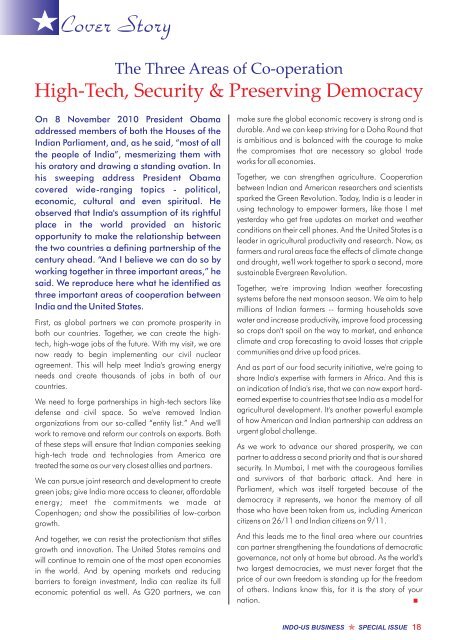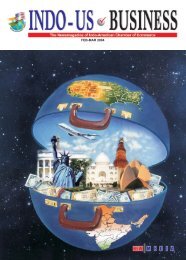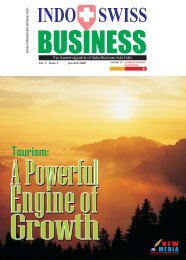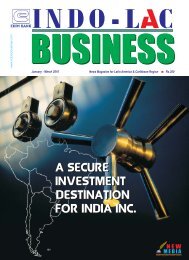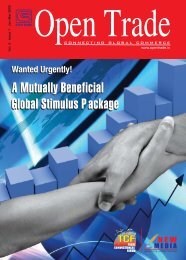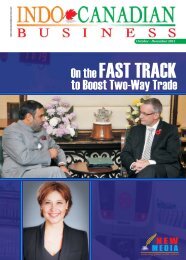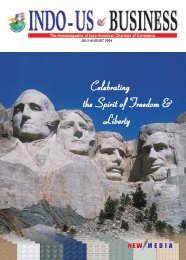Full page fax print - Indo-American Chamber Of Commerce
Full page fax print - Indo-American Chamber Of Commerce
Full page fax print - Indo-American Chamber Of Commerce
Create successful ePaper yourself
Turn your PDF publications into a flip-book with our unique Google optimized e-Paper software.
Cover Story<br />
The Three Areas of Co-operation<br />
High-Tech, Security & Preserving Democracy<br />
On 8 November 2010 President Obama<br />
addressed members of both the Houses of the<br />
Indian Parliament, and, as he said, “most of all<br />
the people of India”, mesmerizing them with<br />
his oratory and drawing a standing ovation. In<br />
his sweeping address President Obama<br />
covered wide-ranging topics - political,<br />
economic, cultural and even spiritual. He<br />
observed that India's assumption of its rightful<br />
place in the world provided an historic<br />
opportunity to make the relationship between<br />
the two countries a defining partnership of the<br />
century ahead. “And I believe we can do so by<br />
working together in three important areas,” he<br />
said. We reproduce here what he identified as<br />
three important areas of cooperation between<br />
India and the United States.<br />
We need to forge partnerships in high-tech sectors like<br />
defense and civil space. So we've removed Indian<br />
organizations from our so-called “entity list.” And we'll<br />
work to remove and reform our controls on exports. Both<br />
of these steps will ensure that Indian companies seeking<br />
high-tech trade and technologies from America are<br />
treated the same as our very closest allies and partners.<br />
We can pursue joint research and development to create<br />
green jobs; give India more access to cleaner, affordable<br />
energy; meet the commitments we made at<br />
Copenhagen; and show the possibilities of low-carbon<br />
growth.<br />
And together, we can resist the protectionism that stifles<br />
growth and innovation. The United States remains and<br />
will continue to remain one of the most open economies<br />
in the world. And by opening markets and reducing<br />
barriers to foreign investment, India can realize its full<br />
economic potential as well. As G20 partners, we can<br />
make sure the global economic recovery is strong and is<br />
durable. And we can keep striving for a Doha Round that<br />
is ambitious and is balanced with the courage to make<br />
the compromises that are necessary so global trade<br />
works for all economies.<br />
Together, we can strengthen agriculture. Cooperation<br />
between Indian and <strong>American</strong> researchers and scientists<br />
sparked the Green Revolution. Today, India is a leader in<br />
using technology to empower farmers, like those I met<br />
yesterday who get free updates on market and weather<br />
conditions on their cell phones. And the United States is a<br />
leader in agricultural productivity and research. Now, as<br />
farmers and rural areas face the effects of climate change<br />
and drought, we'll work together to spark a second, more<br />
sustainable Evergreen Revolution.<br />
First, as global partners we can promote prosperity in<br />
both our countries. Together, we can create the high-<br />
tech, high-wage jobs of the future. With my visit, we are<br />
now ready to begin implementing our civil nuclear<br />
agreement. This will help meet India's growing energy<br />
needs and create thousands of jobs in both of our<br />
countries.<br />
Together, we're improving Indian weather forecasting<br />
systems before the next monsoon season. We aim to help<br />
millions of Indian farmers -- farming households save<br />
water and increase productivity, improve food processing<br />
so crops don't spoil on the way to market, and enhance<br />
climate and crop forecasting to avoid losses that cripple<br />
communities and drive up food prices.<br />
And as part of our food security initiative, we're going to<br />
share India's expertise with farmers in Africa. And this is<br />
an indication of India's rise, that we can now export hardearned<br />
expertise to countries that see India as a model for<br />
agricultural development. It's another powerful example<br />
of how <strong>American</strong> and Indian partnership can address an<br />
urgent global challenge.<br />
As we work to advance our shared prosperity, we can<br />
partner to address a second priority and that is our shared<br />
security. In Mumbai, I met with the courageous families<br />
and survivors of that barbaric attack. And here in<br />
Parliament, which was itself targeted because of the<br />
democracy it represents, we honor the memory of all<br />
those who have been taken from us, including <strong>American</strong><br />
citizens on 26/11 and Indian citizens on 9/11.<br />
And this leads me to the final area where our countries<br />
can partner strengthening the foundations of democratic<br />
governance, not only at home but abroad. As the world's<br />
two largest democracies, we must never forget that the<br />
price of our own freedom is standing up for the freedom<br />
of others. Indians know this, for it is the story of your<br />
nation.<br />
<br />
INDO-US BUSINESS SPECIAL ISSUE<br />
18


